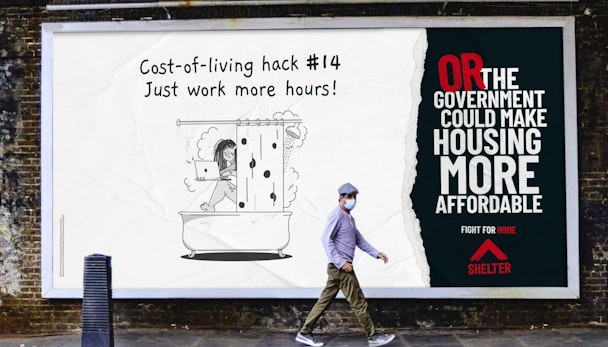Plea to brands: start speaking out against the cost of living crisis
This month, Shelter took a stand against the UK government by mocking its cost of living ‘hacks’ and demanding it acts on spiraling rent inflation in a series of out-of-home (OOH) ads. Industry execs are now calling on more brands to take action.

This shelter campaign took a stand
We recently saw Shelter release a poignant campaign mocking the government’s cost of living ‘hacks.’ Want to save on the things that get you through the day? Re-use your teabags, or simply cancel your Netflix subscription.
Or, as Shelter points out, the government could make affordable housing for all.
It’s a strong message, but it poses the question: is it only charities that can call out the current government’s meek tackles on the cost of living, or should our household brands be stepping up to the mark too?
These industry execs make their case for why the biggest advertisers need to get bold in their comms to help their consumers through the cost of living crisis.
Advertisement
Paul McGuigan, strategy director and co-owner, Thompson
Brands are currently falling into three categories. Type one, or ‘The Price Heroes,’ sees brands tackling the symptoms of the cost of living through clever pricing. Type two, ‘The Mouthpieces,’ combats the symptoms by calling out the government or other influencing bodies for not providing adequate support. Type three, ‘The Changemakers,’ are doing both of these while proactively making suggestions for lobbying policy change.
Brands under type one, such as Boots with its low-priced essentials range, only create real cut-through if they demonstrate a new and deeper empathic understanding of what people are going through. The Shelter campaign, which reflects a fearlessness of ‘getting political’ and taking on the government’s shallow faux empathy, is an excellent example of the second brand type.
The chief executive officer of Shell this week went further than pricing strategies and criticizing current price-cap plans, and said that governments should tax energy and fuel companies more and use the proceeds to help the poor.
It’s powerful because it’s not just a criticism – it’s a direct recommendation of how to make a difference from those who have the power to do so. It was a bold move from Shell, an energy company that has a track record for ruffling the feathers of many activists.
Advertisement
Paul Domenet, partner and creative strategy director, Free The Birds
When a brand’s goal is to raise funds to prevent homelessness, rather than create profit for profit’s sake, it’s much easier to be authentically daring. Brands that do not have such an authentic link between their brand and purpose, or lack a convincing track record of supporting the community around them, could risk attracting a huge public backlash for using the crisis to attract attention (even if that is not their intention) – even more so because some are owned by people who will benefit from the suggested tax cuts.
Suggested newsletters for you
Matt Oakley, strategy and planning director, Taxi Studio
Issues such as the spiraling cost of living are challenging ones for brands and businesses to have a voice on. At times of crisis, people want action, not performative activism, which is why any brand without a combination of pure intentions and unblemished history is wise to be cautious.
HSBC is an example. Historically it has (rightly) been subject to criticism; whether it is its support of the arms trade, money laundering or not taking the climate crisis seriously. More recently though it has given its lowest-paid staff an additional £1500 to help with household bills, and the ‘no fixed address’ initiative is giving people experiencing homelessness a chance to secure housing and subsequently employment. Some would argue that a business of such means should be doing more, but having identified and responded to a need, it is at least taking action that could have a profound impact on people’s lives.
The challenge for HSBC and any other business is how loud they choose to shout about the action they are taking when their pasts could raise a question as to the reason for joining highly emotive conversations.
Tim Jones, head of strategy, Venturethree
The big supermarkets should be standing up. Grocers should have more to say given they are the coalface for consumers during the cost of living crisis. Tesco immediately leaps to mind. Every little helps? How about big public statements that leverage your scale and influence for good by standing up for what you believe in helps? Not as punchy a line, admittedly, but definitely in line with purpose: serving customers, communities and the planet a little better every day. Maybe it takes the ‘little’ too definitively.
Price pledges are fine but, in this context, our supermarkets could be offering more, which in turn could financially benefit them. How refreshing would it be to see one of the big four pick a side? Who knows, a partisan strategy might help them grab a massive share of the market.

